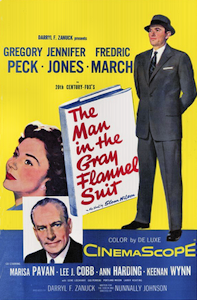The man in the gray flannel suit
| The Man in the Gray Flannel Suit | |
|---|---|

1956 Movie Poster
|
|
| Directed by | Nunnally Johnson |
| Produced by | Darryl F. Zanuck |
| Written by |
Nunnally Johnson (screenplay) Sloan Wilson (novel) |
| Starring |
Gregory Peck Jennifer Jones Fredric March |
| Music by | Bernard Herrmann |
| Cinematography | Charles G. Clarke |
| Edited by | Dorothy Spencer |
| Distributed by | 20th Century Fox |
|
Release date
|
|
|
Running time
|
153 min. |
| Country | United States |
| Language | English |
| Budget | $2,670,000 |
| Box office | $4,350,000 (US rentals) |
The Man in the Gray Flannel Suit is a 1956 American drama film based on the 1955 novel of the same name by Sloan Wilson. The film focuses on Tom Rath, a young World War II veteran trying to balance his marriage and family life with the demands of his work for a New York television network, while dealing with the aftereffects of his war service. The film stars Gregory Peck as Tom Rath and Jennifer Jones as his wife Betsy, with Fredric March, Lee J. Cobb, Keenan Wynn and Marisa Pavan in supporting roles. It was entered at the 1956 Cannes Film Festival.
Ten years after the end of World War II, Tom Rath (Gregory Peck) is living in suburban Connecticut with his wife Betsy (Jennifer Jones) and three children, and having difficulty supporting his family on his salary writing for a nonprofit organization. Tom is also dealing with flashbacks from his combat service as an Army Captain in both the European and Pacific theaters, involving men that he killed (including, by accident, his best friend), and a young Italian girl named Maria (Marisa Pavan), with whom he had a brief but heartfelt affair in Italy despite his being married to Betsy at the time. Before Tom left Maria for the final time to go back into battle, the couple went on a picnic. The two were lying down beside each other when Maria told Tom that she was pregnant. She said she was going to keep the baby. Tom would never see her or the child again.
When an expected inheritance from Tom's recently deceased grandmother turns out to have been depleted, leaving only her large and not saleable mansion, Betsy pressures Tom to seek a higher-paying job. Acting on a tip from a fellow train commuter, Tom interviews for an opening at the television network UBC, but when asked to write his autobiography as part of the interview process, he refuses. He is hired anyway for a public relations job, helping the network president Ralph Hopkins (Fredric March) launch a national mental health campaign. Hopkins is powerful and highly respected at the office, but unbeknownst to his employees, his workaholic habits have caused him to be estranged from his wife and his rebellious daughter, who soon elopes with an unsuitable man.
...
Wikipedia
